HND International Travel and Tourism Business Toolkit Report - 2019
VerifiedAdded on 2023/01/16
|13
|4032
|27
Report
AI Summary
This report provides a comprehensive analysis of the Travel and Tourism Business Toolkit, focusing on key aspects relevant to the tourism industry. The report is structured into three main parts: sales, budget, and revenue management; HR life cycle and strategy; and legislation and ethics. The first part explores revenue management principles, including overbooking, market segmentation, and tools like discount allocation. It also delves into budget management, financial statements, and ratio analysis to evaluate business performance. The second part examines the HR life cycle, including recruitment, education, motivation, and evaluation, with a focus on retaining skilled employees within an organization. The final part addresses the potential impact of legal and ethical considerations on travel and tourism businesses. The report uses British Airways as a case study throughout to illustrate the application of these concepts. The report concludes with a summary of the findings and a list of references.
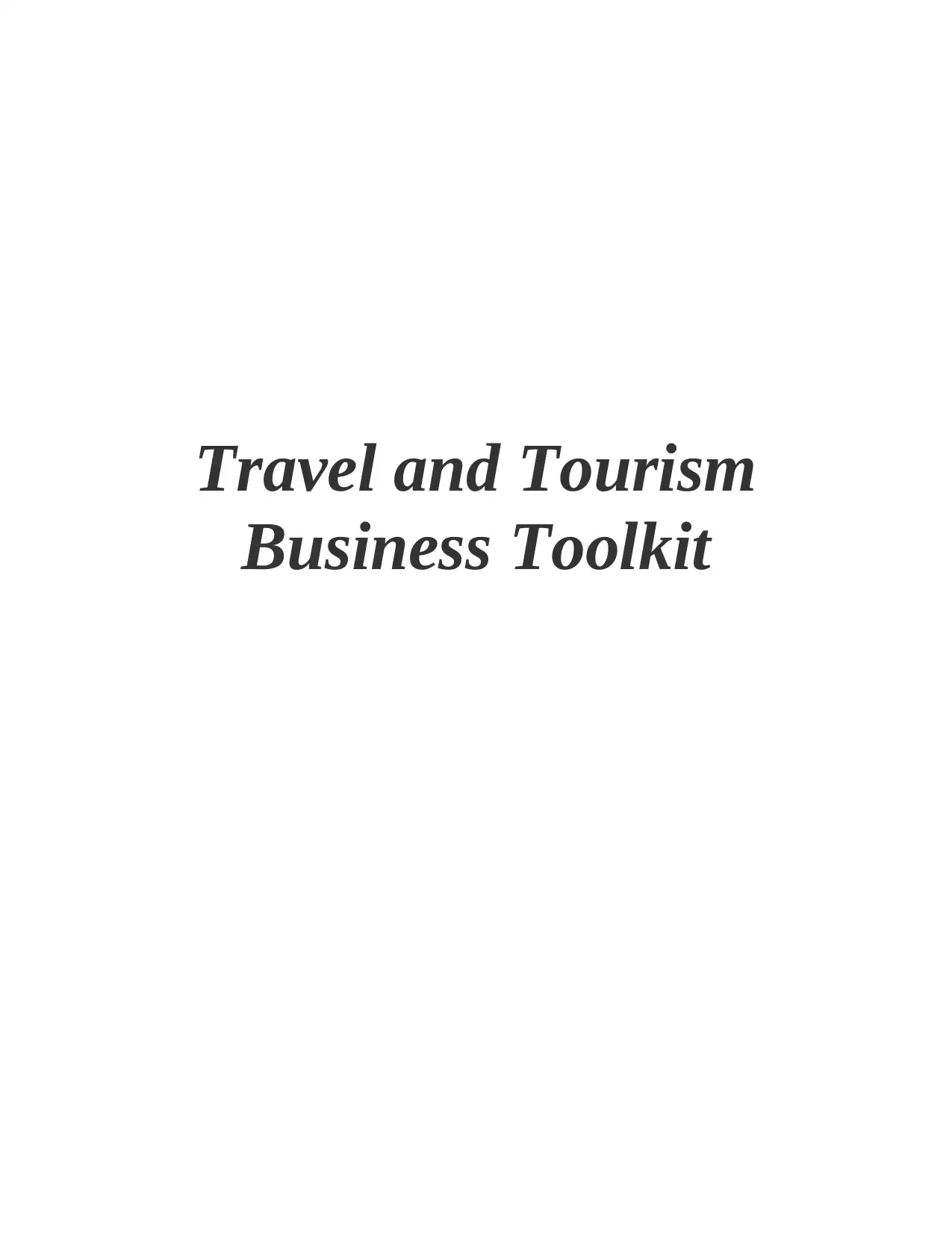
Travel and Tourism
Business Toolkit
Business Toolkit
Paraphrase This Document
Need a fresh take? Get an instant paraphrase of this document with our AI Paraphraser
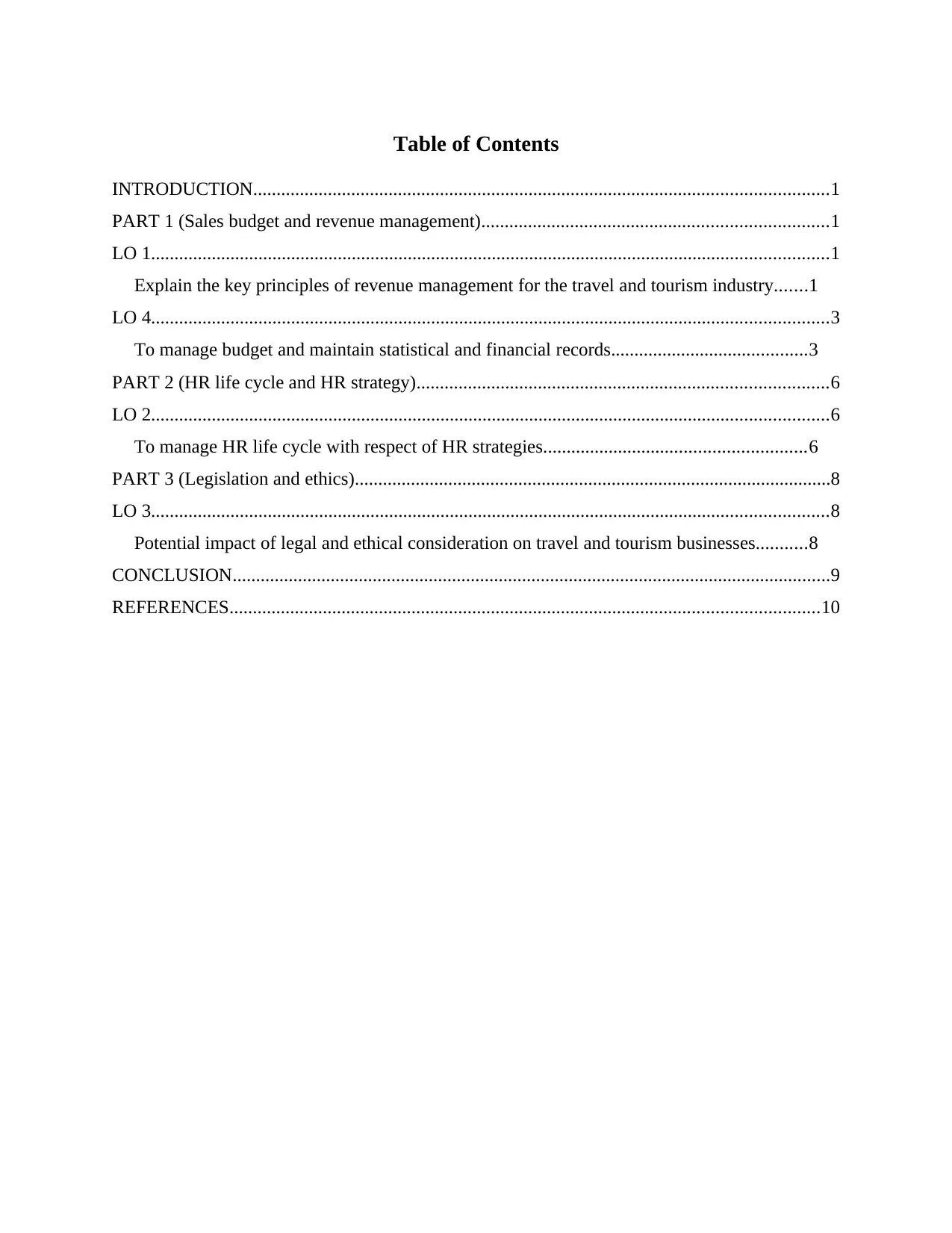
Table of Contents
INTRODUCTION...........................................................................................................................1
PART 1 (Sales budget and revenue management)..........................................................................1
LO 1.................................................................................................................................................1
Explain the key principles of revenue management for the travel and tourism industry.......1
LO 4.................................................................................................................................................3
To manage budget and maintain statistical and financial records..........................................3
PART 2 (HR life cycle and HR strategy)........................................................................................6
LO 2.................................................................................................................................................6
To manage HR life cycle with respect of HR strategies........................................................6
PART 3 (Legislation and ethics)......................................................................................................8
LO 3.................................................................................................................................................8
Potential impact of legal and ethical consideration on travel and tourism businesses...........8
CONCLUSION................................................................................................................................9
REFERENCES..............................................................................................................................10
INTRODUCTION...........................................................................................................................1
PART 1 (Sales budget and revenue management)..........................................................................1
LO 1.................................................................................................................................................1
Explain the key principles of revenue management for the travel and tourism industry.......1
LO 4.................................................................................................................................................3
To manage budget and maintain statistical and financial records..........................................3
PART 2 (HR life cycle and HR strategy)........................................................................................6
LO 2.................................................................................................................................................6
To manage HR life cycle with respect of HR strategies........................................................6
PART 3 (Legislation and ethics)......................................................................................................8
LO 3.................................................................................................................................................8
Potential impact of legal and ethical consideration on travel and tourism businesses...........8
CONCLUSION................................................................................................................................9
REFERENCES..............................................................................................................................10
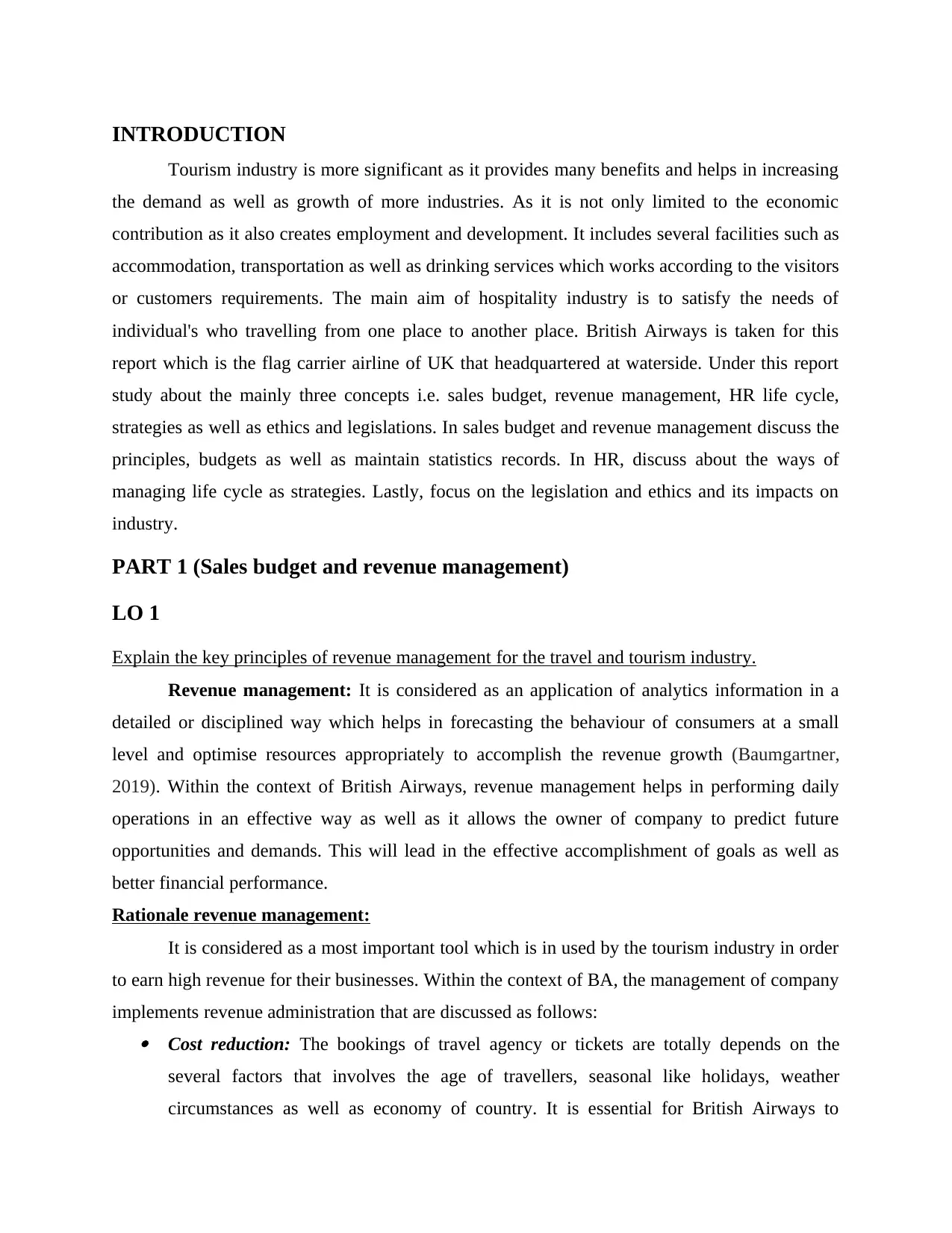
INTRODUCTION
Tourism industry is more significant as it provides many benefits and helps in increasing
the demand as well as growth of more industries. As it is not only limited to the economic
contribution as it also creates employment and development. It includes several facilities such as
accommodation, transportation as well as drinking services which works according to the visitors
or customers requirements. The main aim of hospitality industry is to satisfy the needs of
individual's who travelling from one place to another place. British Airways is taken for this
report which is the flag carrier airline of UK that headquartered at waterside. Under this report
study about the mainly three concepts i.e. sales budget, revenue management, HR life cycle,
strategies as well as ethics and legislations. In sales budget and revenue management discuss the
principles, budgets as well as maintain statistics records. In HR, discuss about the ways of
managing life cycle as strategies. Lastly, focus on the legislation and ethics and its impacts on
industry.
PART 1 (Sales budget and revenue management)
LO 1
Explain the key principles of revenue management for the travel and tourism industry.
Revenue management: It is considered as an application of analytics information in a
detailed or disciplined way which helps in forecasting the behaviour of consumers at a small
level and optimise resources appropriately to accomplish the revenue growth (Baumgartner,
2019). Within the context of British Airways, revenue management helps in performing daily
operations in an effective way as well as it allows the owner of company to predict future
opportunities and demands. This will lead in the effective accomplishment of goals as well as
better financial performance.
Rationale revenue management:
It is considered as a most important tool which is in used by the tourism industry in order
to earn high revenue for their businesses. Within the context of BA, the management of company
implements revenue administration that are discussed as follows: Cost reduction: The bookings of travel agency or tickets are totally depends on the
several factors that involves the age of travellers, seasonal like holidays, weather
circumstances as well as economy of country. It is essential for British Airways to
Tourism industry is more significant as it provides many benefits and helps in increasing
the demand as well as growth of more industries. As it is not only limited to the economic
contribution as it also creates employment and development. It includes several facilities such as
accommodation, transportation as well as drinking services which works according to the visitors
or customers requirements. The main aim of hospitality industry is to satisfy the needs of
individual's who travelling from one place to another place. British Airways is taken for this
report which is the flag carrier airline of UK that headquartered at waterside. Under this report
study about the mainly three concepts i.e. sales budget, revenue management, HR life cycle,
strategies as well as ethics and legislations. In sales budget and revenue management discuss the
principles, budgets as well as maintain statistics records. In HR, discuss about the ways of
managing life cycle as strategies. Lastly, focus on the legislation and ethics and its impacts on
industry.
PART 1 (Sales budget and revenue management)
LO 1
Explain the key principles of revenue management for the travel and tourism industry.
Revenue management: It is considered as an application of analytics information in a
detailed or disciplined way which helps in forecasting the behaviour of consumers at a small
level and optimise resources appropriately to accomplish the revenue growth (Baumgartner,
2019). Within the context of British Airways, revenue management helps in performing daily
operations in an effective way as well as it allows the owner of company to predict future
opportunities and demands. This will lead in the effective accomplishment of goals as well as
better financial performance.
Rationale revenue management:
It is considered as a most important tool which is in used by the tourism industry in order
to earn high revenue for their businesses. Within the context of BA, the management of company
implements revenue administration that are discussed as follows: Cost reduction: The bookings of travel agency or tickets are totally depends on the
several factors that involves the age of travellers, seasonal like holidays, weather
circumstances as well as economy of country. It is essential for British Airways to
⊘ This is a preview!⊘
Do you want full access?
Subscribe today to unlock all pages.

Trusted by 1+ million students worldwide
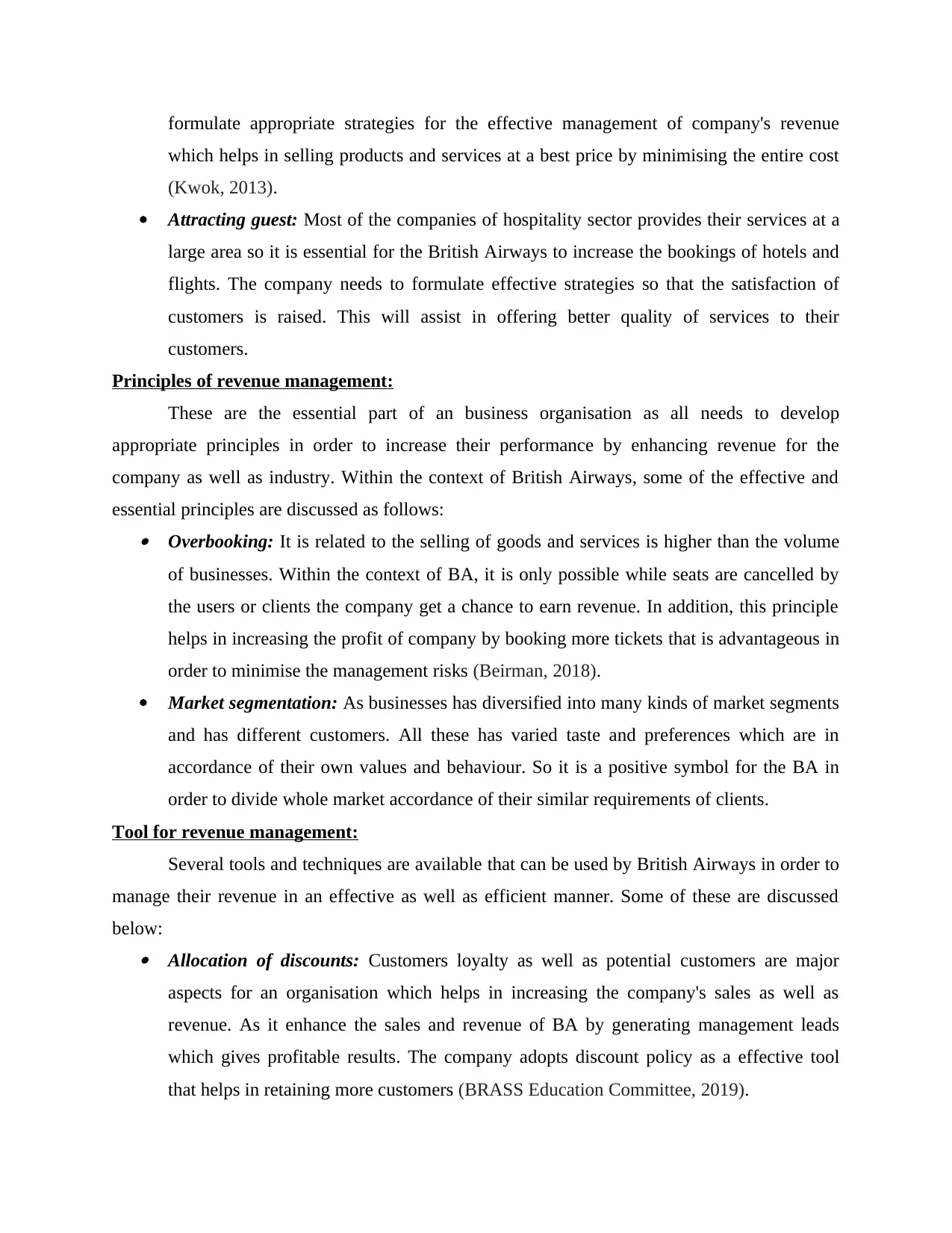
formulate appropriate strategies for the effective management of company's revenue
which helps in selling products and services at a best price by minimising the entire cost
(Kwok, 2013).
Attracting guest: Most of the companies of hospitality sector provides their services at a
large area so it is essential for the British Airways to increase the bookings of hotels and
flights. The company needs to formulate effective strategies so that the satisfaction of
customers is raised. This will assist in offering better quality of services to their
customers.
Principles of revenue management:
These are the essential part of an business organisation as all needs to develop
appropriate principles in order to increase their performance by enhancing revenue for the
company as well as industry. Within the context of British Airways, some of the effective and
essential principles are discussed as follows: Overbooking: It is related to the selling of goods and services is higher than the volume
of businesses. Within the context of BA, it is only possible while seats are cancelled by
the users or clients the company get a chance to earn revenue. In addition, this principle
helps in increasing the profit of company by booking more tickets that is advantageous in
order to minimise the management risks (Beirman, 2018).
Market segmentation: As businesses has diversified into many kinds of market segments
and has different customers. All these has varied taste and preferences which are in
accordance of their own values and behaviour. So it is a positive symbol for the BA in
order to divide whole market accordance of their similar requirements of clients.
Tool for revenue management:
Several tools and techniques are available that can be used by British Airways in order to
manage their revenue in an effective as well as efficient manner. Some of these are discussed
below: Allocation of discounts: Customers loyalty as well as potential customers are major
aspects for an organisation which helps in increasing the company's sales as well as
revenue. As it enhance the sales and revenue of BA by generating management leads
which gives profitable results. The company adopts discount policy as a effective tool
that helps in retaining more customers (BRASS Education Committee, 2019).
which helps in selling products and services at a best price by minimising the entire cost
(Kwok, 2013).
Attracting guest: Most of the companies of hospitality sector provides their services at a
large area so it is essential for the British Airways to increase the bookings of hotels and
flights. The company needs to formulate effective strategies so that the satisfaction of
customers is raised. This will assist in offering better quality of services to their
customers.
Principles of revenue management:
These are the essential part of an business organisation as all needs to develop
appropriate principles in order to increase their performance by enhancing revenue for the
company as well as industry. Within the context of British Airways, some of the effective and
essential principles are discussed as follows: Overbooking: It is related to the selling of goods and services is higher than the volume
of businesses. Within the context of BA, it is only possible while seats are cancelled by
the users or clients the company get a chance to earn revenue. In addition, this principle
helps in increasing the profit of company by booking more tickets that is advantageous in
order to minimise the management risks (Beirman, 2018).
Market segmentation: As businesses has diversified into many kinds of market segments
and has different customers. All these has varied taste and preferences which are in
accordance of their own values and behaviour. So it is a positive symbol for the BA in
order to divide whole market accordance of their similar requirements of clients.
Tool for revenue management:
Several tools and techniques are available that can be used by British Airways in order to
manage their revenue in an effective as well as efficient manner. Some of these are discussed
below: Allocation of discounts: Customers loyalty as well as potential customers are major
aspects for an organisation which helps in increasing the company's sales as well as
revenue. As it enhance the sales and revenue of BA by generating management leads
which gives profitable results. The company adopts discount policy as a effective tool
that helps in retaining more customers (BRASS Education Committee, 2019).
Paraphrase This Document
Need a fresh take? Get an instant paraphrase of this document with our AI Paraphraser
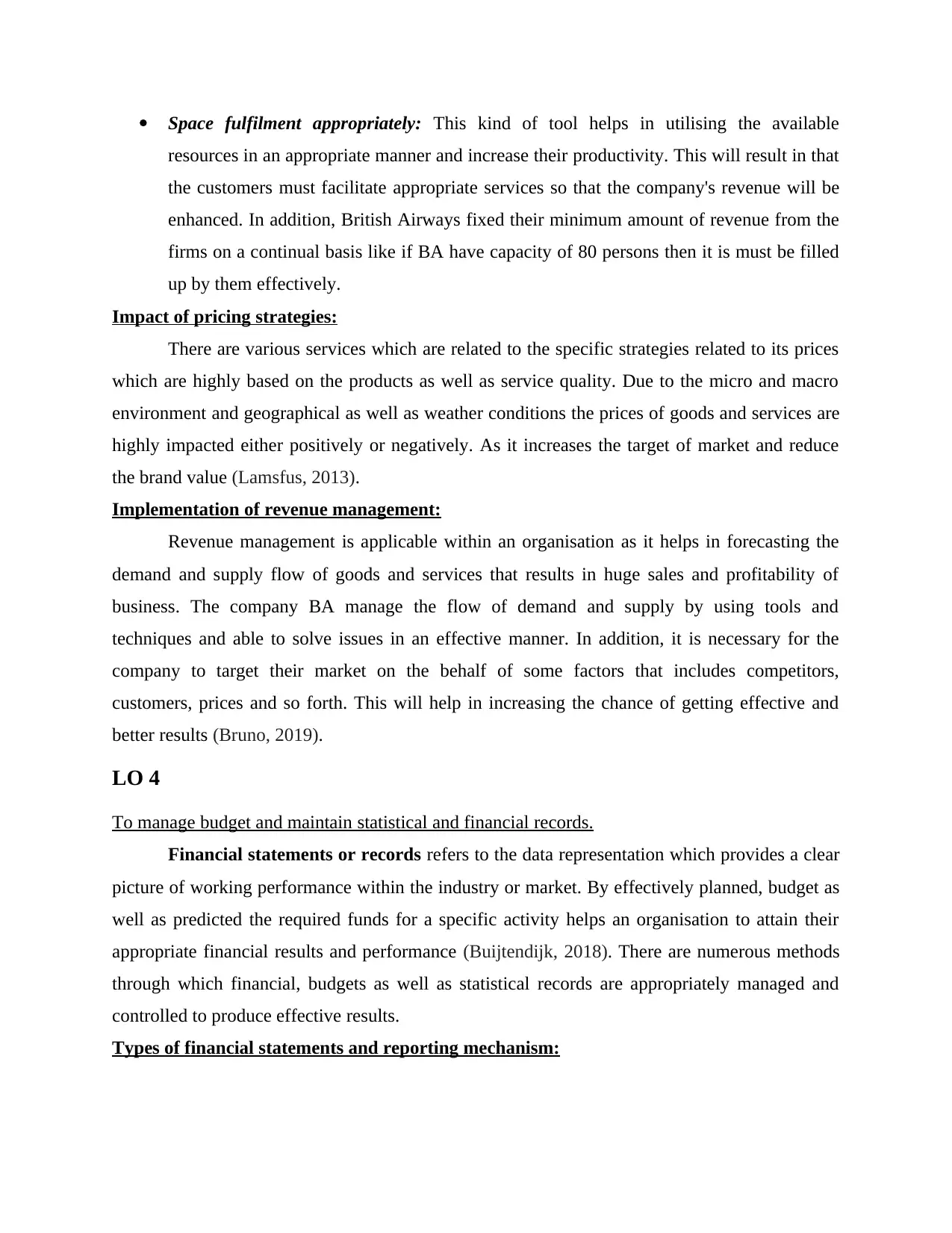
Space fulfilment appropriately: This kind of tool helps in utilising the available
resources in an appropriate manner and increase their productivity. This will result in that
the customers must facilitate appropriate services so that the company's revenue will be
enhanced. In addition, British Airways fixed their minimum amount of revenue from the
firms on a continual basis like if BA have capacity of 80 persons then it is must be filled
up by them effectively.
Impact of pricing strategies:
There are various services which are related to the specific strategies related to its prices
which are highly based on the products as well as service quality. Due to the micro and macro
environment and geographical as well as weather conditions the prices of goods and services are
highly impacted either positively or negatively. As it increases the target of market and reduce
the brand value (Lamsfus, 2013).
Implementation of revenue management:
Revenue management is applicable within an organisation as it helps in forecasting the
demand and supply flow of goods and services that results in huge sales and profitability of
business. The company BA manage the flow of demand and supply by using tools and
techniques and able to solve issues in an effective manner. In addition, it is necessary for the
company to target their market on the behalf of some factors that includes competitors,
customers, prices and so forth. This will help in increasing the chance of getting effective and
better results (Bruno, 2019).
LO 4
To manage budget and maintain statistical and financial records.
Financial statements or records refers to the data representation which provides a clear
picture of working performance within the industry or market. By effectively planned, budget as
well as predicted the required funds for a specific activity helps an organisation to attain their
appropriate financial results and performance (Buijtendijk, 2018). There are numerous methods
through which financial, budgets as well as statistical records are appropriately managed and
controlled to produce effective results.
Types of financial statements and reporting mechanism:
resources in an appropriate manner and increase their productivity. This will result in that
the customers must facilitate appropriate services so that the company's revenue will be
enhanced. In addition, British Airways fixed their minimum amount of revenue from the
firms on a continual basis like if BA have capacity of 80 persons then it is must be filled
up by them effectively.
Impact of pricing strategies:
There are various services which are related to the specific strategies related to its prices
which are highly based on the products as well as service quality. Due to the micro and macro
environment and geographical as well as weather conditions the prices of goods and services are
highly impacted either positively or negatively. As it increases the target of market and reduce
the brand value (Lamsfus, 2013).
Implementation of revenue management:
Revenue management is applicable within an organisation as it helps in forecasting the
demand and supply flow of goods and services that results in huge sales and profitability of
business. The company BA manage the flow of demand and supply by using tools and
techniques and able to solve issues in an effective manner. In addition, it is necessary for the
company to target their market on the behalf of some factors that includes competitors,
customers, prices and so forth. This will help in increasing the chance of getting effective and
better results (Bruno, 2019).
LO 4
To manage budget and maintain statistical and financial records.
Financial statements or records refers to the data representation which provides a clear
picture of working performance within the industry or market. By effectively planned, budget as
well as predicted the required funds for a specific activity helps an organisation to attain their
appropriate financial results and performance (Buijtendijk, 2018). There are numerous methods
through which financial, budgets as well as statistical records are appropriately managed and
controlled to produce effective results.
Types of financial statements and reporting mechanism:
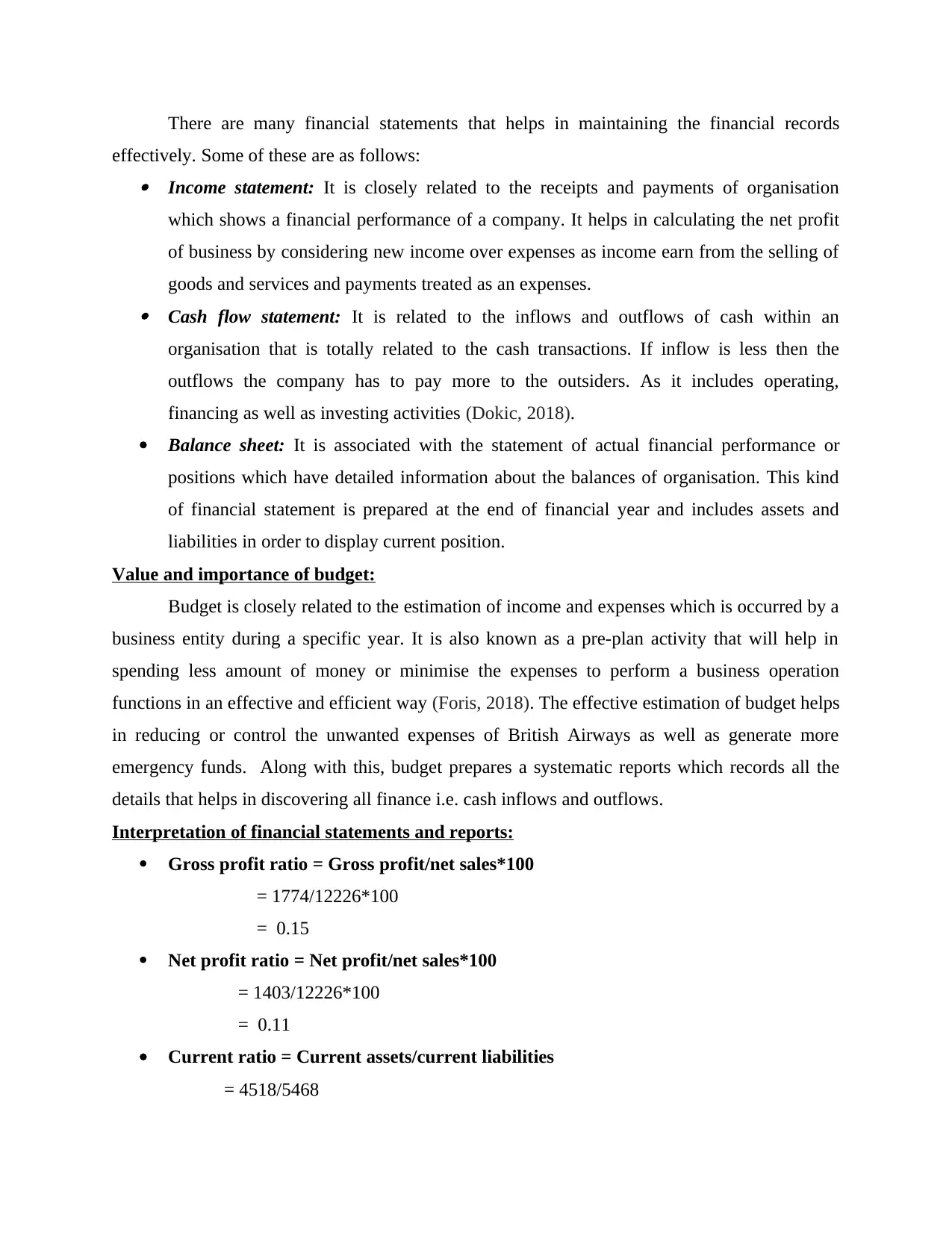
There are many financial statements that helps in maintaining the financial records
effectively. Some of these are as follows: Income statement: It is closely related to the receipts and payments of organisation
which shows a financial performance of a company. It helps in calculating the net profit
of business by considering new income over expenses as income earn from the selling of
goods and services and payments treated as an expenses. Cash flow statement: It is related to the inflows and outflows of cash within an
organisation that is totally related to the cash transactions. If inflow is less then the
outflows the company has to pay more to the outsiders. As it includes operating,
financing as well as investing activities (Dokic, 2018).
Balance sheet: It is associated with the statement of actual financial performance or
positions which have detailed information about the balances of organisation. This kind
of financial statement is prepared at the end of financial year and includes assets and
liabilities in order to display current position.
Value and importance of budget:
Budget is closely related to the estimation of income and expenses which is occurred by a
business entity during a specific year. It is also known as a pre-plan activity that will help in
spending less amount of money or minimise the expenses to perform a business operation
functions in an effective and efficient way (Foris, 2018). The effective estimation of budget helps
in reducing or control the unwanted expenses of British Airways as well as generate more
emergency funds. Along with this, budget prepares a systematic reports which records all the
details that helps in discovering all finance i.e. cash inflows and outflows.
Interpretation of financial statements and reports:
Gross profit ratio = Gross profit/net sales*100
= 1774/12226*100
= 0.15
Net profit ratio = Net profit/net sales*100
= 1403/12226*100
= 0.11
Current ratio = Current assets/current liabilities
= 4518/5468
effectively. Some of these are as follows: Income statement: It is closely related to the receipts and payments of organisation
which shows a financial performance of a company. It helps in calculating the net profit
of business by considering new income over expenses as income earn from the selling of
goods and services and payments treated as an expenses. Cash flow statement: It is related to the inflows and outflows of cash within an
organisation that is totally related to the cash transactions. If inflow is less then the
outflows the company has to pay more to the outsiders. As it includes operating,
financing as well as investing activities (Dokic, 2018).
Balance sheet: It is associated with the statement of actual financial performance or
positions which have detailed information about the balances of organisation. This kind
of financial statement is prepared at the end of financial year and includes assets and
liabilities in order to display current position.
Value and importance of budget:
Budget is closely related to the estimation of income and expenses which is occurred by a
business entity during a specific year. It is also known as a pre-plan activity that will help in
spending less amount of money or minimise the expenses to perform a business operation
functions in an effective and efficient way (Foris, 2018). The effective estimation of budget helps
in reducing or control the unwanted expenses of British Airways as well as generate more
emergency funds. Along with this, budget prepares a systematic reports which records all the
details that helps in discovering all finance i.e. cash inflows and outflows.
Interpretation of financial statements and reports:
Gross profit ratio = Gross profit/net sales*100
= 1774/12226*100
= 0.15
Net profit ratio = Net profit/net sales*100
= 1403/12226*100
= 0.11
Current ratio = Current assets/current liabilities
= 4518/5468
⊘ This is a preview!⊘
Do you want full access?
Subscribe today to unlock all pages.

Trusted by 1+ million students worldwide
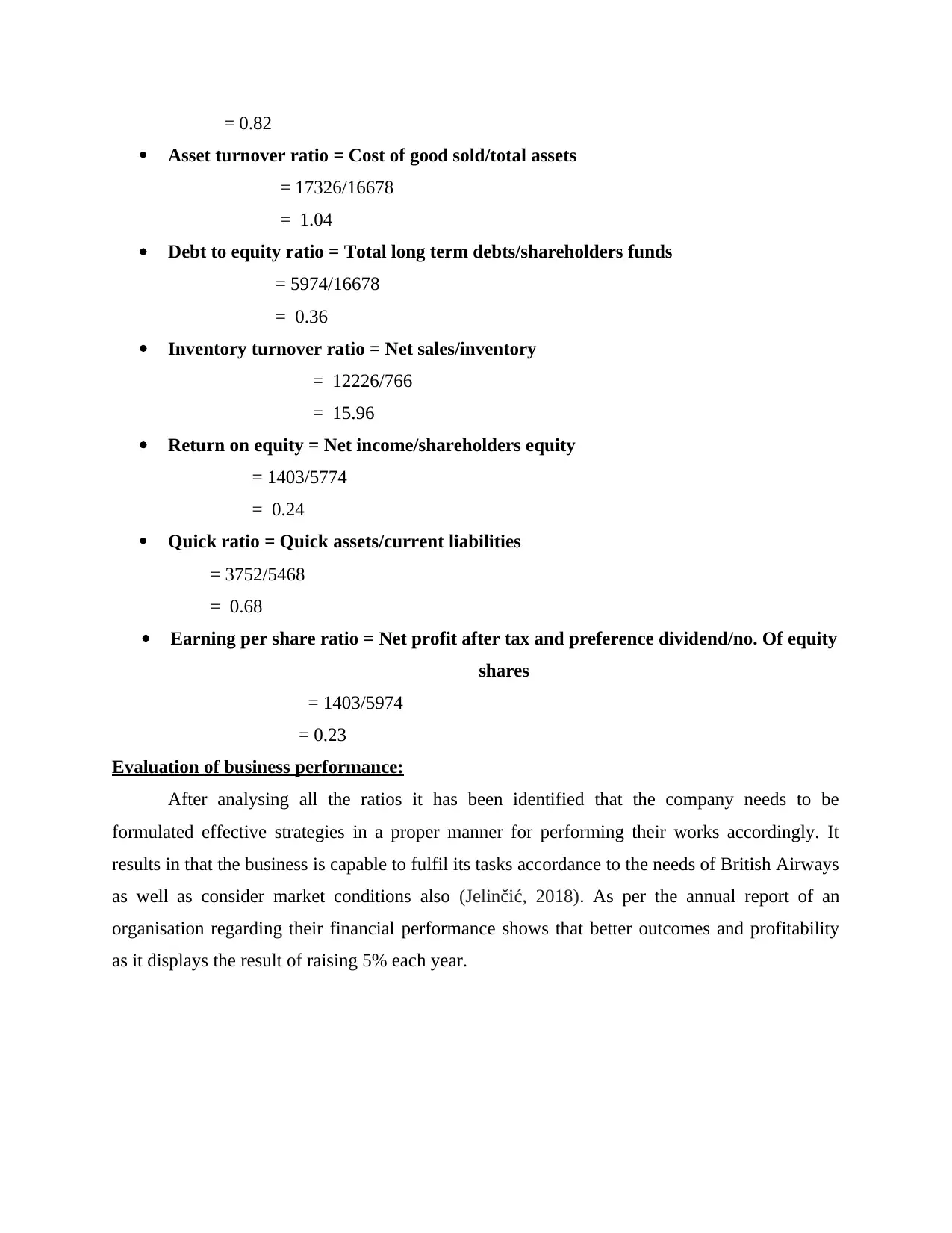
= 0.82
Asset turnover ratio = Cost of good sold/total assets
= 17326/16678
= 1.04
Debt to equity ratio = Total long term debts/shareholders funds
= 5974/16678
= 0.36
Inventory turnover ratio = Net sales/inventory
= 12226/766
= 15.96
Return on equity = Net income/shareholders equity
= 1403/5774
= 0.24
Quick ratio = Quick assets/current liabilities
= 3752/5468
= 0.68
Earning per share ratio = Net profit after tax and preference dividend/no. Of equity
shares
= 1403/5974
= 0.23
Evaluation of business performance:
After analysing all the ratios it has been identified that the company needs to be
formulated effective strategies in a proper manner for performing their works accordingly. It
results in that the business is capable to fulfil its tasks accordance to the needs of British Airways
as well as consider market conditions also (Jelinčić, 2018). As per the annual report of an
organisation regarding their financial performance shows that better outcomes and profitability
as it displays the result of raising 5% each year.
Asset turnover ratio = Cost of good sold/total assets
= 17326/16678
= 1.04
Debt to equity ratio = Total long term debts/shareholders funds
= 5974/16678
= 0.36
Inventory turnover ratio = Net sales/inventory
= 12226/766
= 15.96
Return on equity = Net income/shareholders equity
= 1403/5774
= 0.24
Quick ratio = Quick assets/current liabilities
= 3752/5468
= 0.68
Earning per share ratio = Net profit after tax and preference dividend/no. Of equity
shares
= 1403/5974
= 0.23
Evaluation of business performance:
After analysing all the ratios it has been identified that the company needs to be
formulated effective strategies in a proper manner for performing their works accordingly. It
results in that the business is capable to fulfil its tasks accordance to the needs of British Airways
as well as consider market conditions also (Jelinčić, 2018). As per the annual report of an
organisation regarding their financial performance shows that better outcomes and profitability
as it displays the result of raising 5% each year.
Paraphrase This Document
Need a fresh take? Get an instant paraphrase of this document with our AI Paraphraser
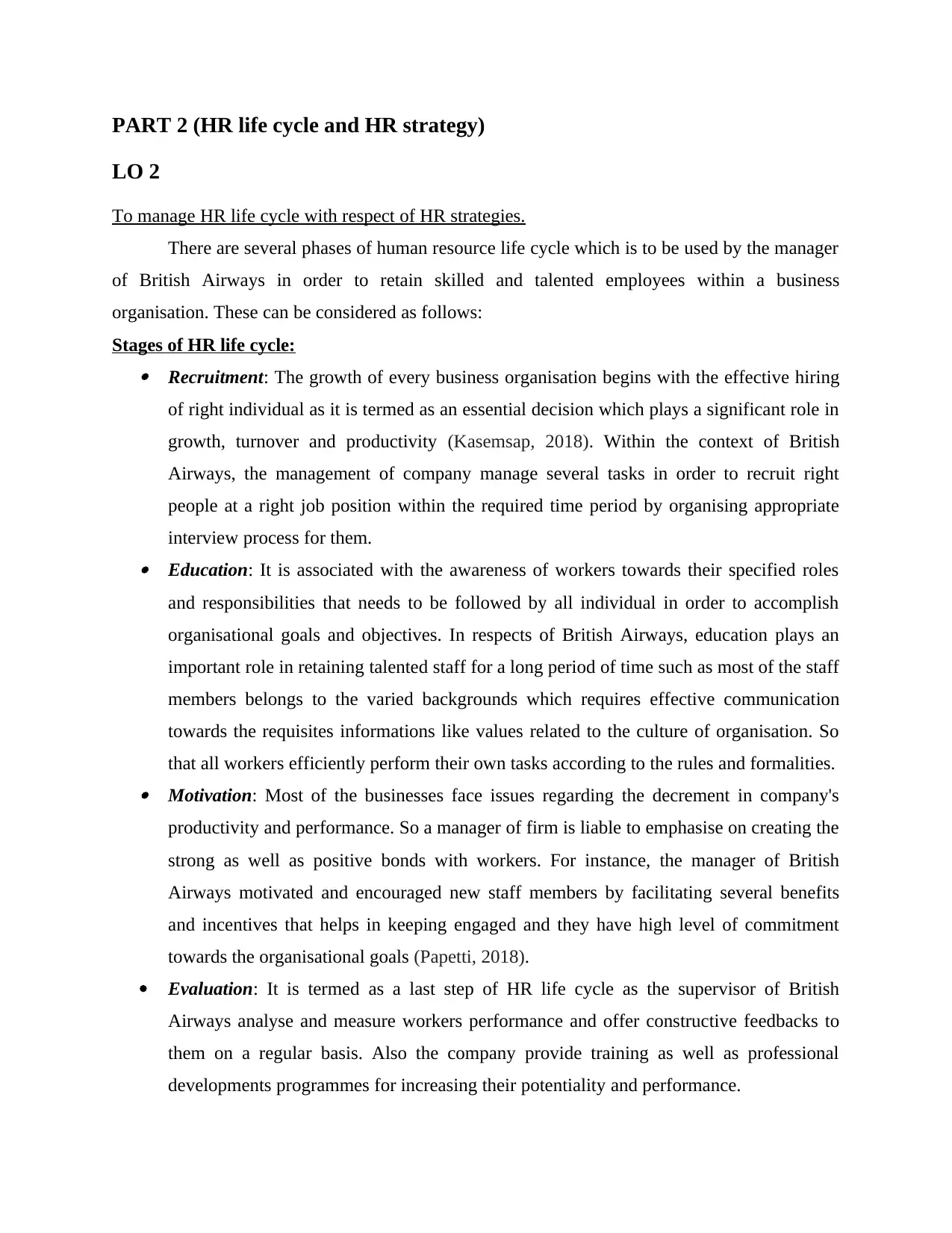
PART 2 (HR life cycle and HR strategy)
LO 2
To manage HR life cycle with respect of HR strategies.
There are several phases of human resource life cycle which is to be used by the manager
of British Airways in order to retain skilled and talented employees within a business
organisation. These can be considered as follows:
Stages of HR life cycle: Recruitment: The growth of every business organisation begins with the effective hiring
of right individual as it is termed as an essential decision which plays a significant role in
growth, turnover and productivity (Kasemsap, 2018). Within the context of British
Airways, the management of company manage several tasks in order to recruit right
people at a right job position within the required time period by organising appropriate
interview process for them. Education: It is associated with the awareness of workers towards their specified roles
and responsibilities that needs to be followed by all individual in order to accomplish
organisational goals and objectives. In respects of British Airways, education plays an
important role in retaining talented staff for a long period of time such as most of the staff
members belongs to the varied backgrounds which requires effective communication
towards the requisites informations like values related to the culture of organisation. So
that all workers efficiently perform their own tasks according to the rules and formalities. Motivation: Most of the businesses face issues regarding the decrement in company's
productivity and performance. So a manager of firm is liable to emphasise on creating the
strong as well as positive bonds with workers. For instance, the manager of British
Airways motivated and encouraged new staff members by facilitating several benefits
and incentives that helps in keeping engaged and they have high level of commitment
towards the organisational goals (Papetti, 2018).
Evaluation: It is termed as a last step of HR life cycle as the supervisor of British
Airways analyse and measure workers performance and offer constructive feedbacks to
them on a regular basis. Also the company provide training as well as professional
developments programmes for increasing their potentiality and performance.
LO 2
To manage HR life cycle with respect of HR strategies.
There are several phases of human resource life cycle which is to be used by the manager
of British Airways in order to retain skilled and talented employees within a business
organisation. These can be considered as follows:
Stages of HR life cycle: Recruitment: The growth of every business organisation begins with the effective hiring
of right individual as it is termed as an essential decision which plays a significant role in
growth, turnover and productivity (Kasemsap, 2018). Within the context of British
Airways, the management of company manage several tasks in order to recruit right
people at a right job position within the required time period by organising appropriate
interview process for them. Education: It is associated with the awareness of workers towards their specified roles
and responsibilities that needs to be followed by all individual in order to accomplish
organisational goals and objectives. In respects of British Airways, education plays an
important role in retaining talented staff for a long period of time such as most of the staff
members belongs to the varied backgrounds which requires effective communication
towards the requisites informations like values related to the culture of organisation. So
that all workers efficiently perform their own tasks according to the rules and formalities. Motivation: Most of the businesses face issues regarding the decrement in company's
productivity and performance. So a manager of firm is liable to emphasise on creating the
strong as well as positive bonds with workers. For instance, the manager of British
Airways motivated and encouraged new staff members by facilitating several benefits
and incentives that helps in keeping engaged and they have high level of commitment
towards the organisational goals (Papetti, 2018).
Evaluation: It is termed as a last step of HR life cycle as the supervisor of British
Airways analyse and measure workers performance and offer constructive feedbacks to
them on a regular basis. Also the company provide training as well as professional
developments programmes for increasing their potentiality and performance.
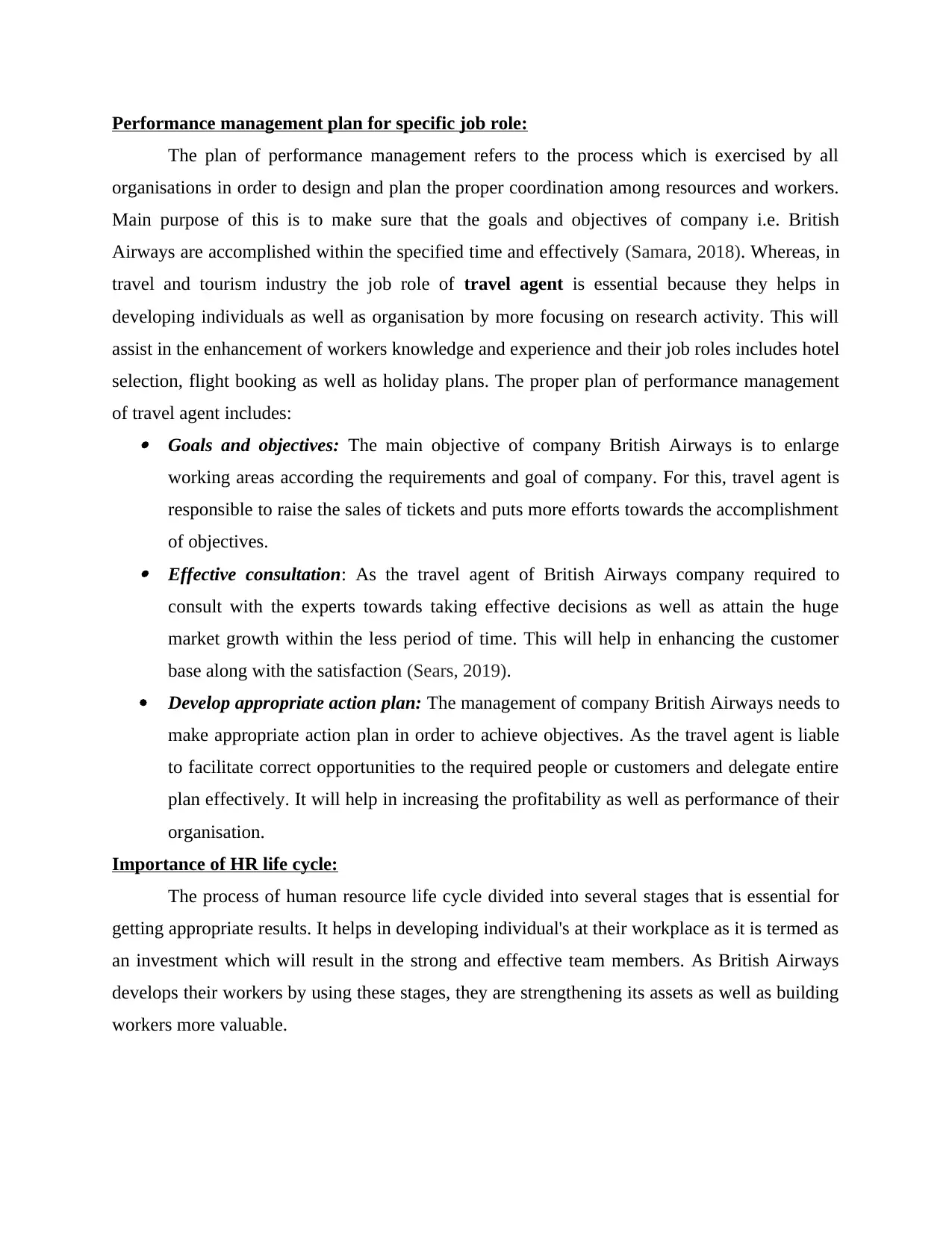
Performance management plan for specific job role:
The plan of performance management refers to the process which is exercised by all
organisations in order to design and plan the proper coordination among resources and workers.
Main purpose of this is to make sure that the goals and objectives of company i.e. British
Airways are accomplished within the specified time and effectively (Samara, 2018). Whereas, in
travel and tourism industry the job role of travel agent is essential because they helps in
developing individuals as well as organisation by more focusing on research activity. This will
assist in the enhancement of workers knowledge and experience and their job roles includes hotel
selection, flight booking as well as holiday plans. The proper plan of performance management
of travel agent includes: Goals and objectives: The main objective of company British Airways is to enlarge
working areas according the requirements and goal of company. For this, travel agent is
responsible to raise the sales of tickets and puts more efforts towards the accomplishment
of objectives. Effective consultation: As the travel agent of British Airways company required to
consult with the experts towards taking effective decisions as well as attain the huge
market growth within the less period of time. This will help in enhancing the customer
base along with the satisfaction (Sears, 2019).
Develop appropriate action plan: The management of company British Airways needs to
make appropriate action plan in order to achieve objectives. As the travel agent is liable
to facilitate correct opportunities to the required people or customers and delegate entire
plan effectively. It will help in increasing the profitability as well as performance of their
organisation.
Importance of HR life cycle:
The process of human resource life cycle divided into several stages that is essential for
getting appropriate results. It helps in developing individual's at their workplace as it is termed as
an investment which will result in the strong and effective team members. As British Airways
develops their workers by using these stages, they are strengthening its assets as well as building
workers more valuable.
The plan of performance management refers to the process which is exercised by all
organisations in order to design and plan the proper coordination among resources and workers.
Main purpose of this is to make sure that the goals and objectives of company i.e. British
Airways are accomplished within the specified time and effectively (Samara, 2018). Whereas, in
travel and tourism industry the job role of travel agent is essential because they helps in
developing individuals as well as organisation by more focusing on research activity. This will
assist in the enhancement of workers knowledge and experience and their job roles includes hotel
selection, flight booking as well as holiday plans. The proper plan of performance management
of travel agent includes: Goals and objectives: The main objective of company British Airways is to enlarge
working areas according the requirements and goal of company. For this, travel agent is
responsible to raise the sales of tickets and puts more efforts towards the accomplishment
of objectives. Effective consultation: As the travel agent of British Airways company required to
consult with the experts towards taking effective decisions as well as attain the huge
market growth within the less period of time. This will help in enhancing the customer
base along with the satisfaction (Sears, 2019).
Develop appropriate action plan: The management of company British Airways needs to
make appropriate action plan in order to achieve objectives. As the travel agent is liable
to facilitate correct opportunities to the required people or customers and delegate entire
plan effectively. It will help in increasing the profitability as well as performance of their
organisation.
Importance of HR life cycle:
The process of human resource life cycle divided into several stages that is essential for
getting appropriate results. It helps in developing individual's at their workplace as it is termed as
an investment which will result in the strong and effective team members. As British Airways
develops their workers by using these stages, they are strengthening its assets as well as building
workers more valuable.
⊘ This is a preview!⊘
Do you want full access?
Subscribe today to unlock all pages.

Trusted by 1+ million students worldwide
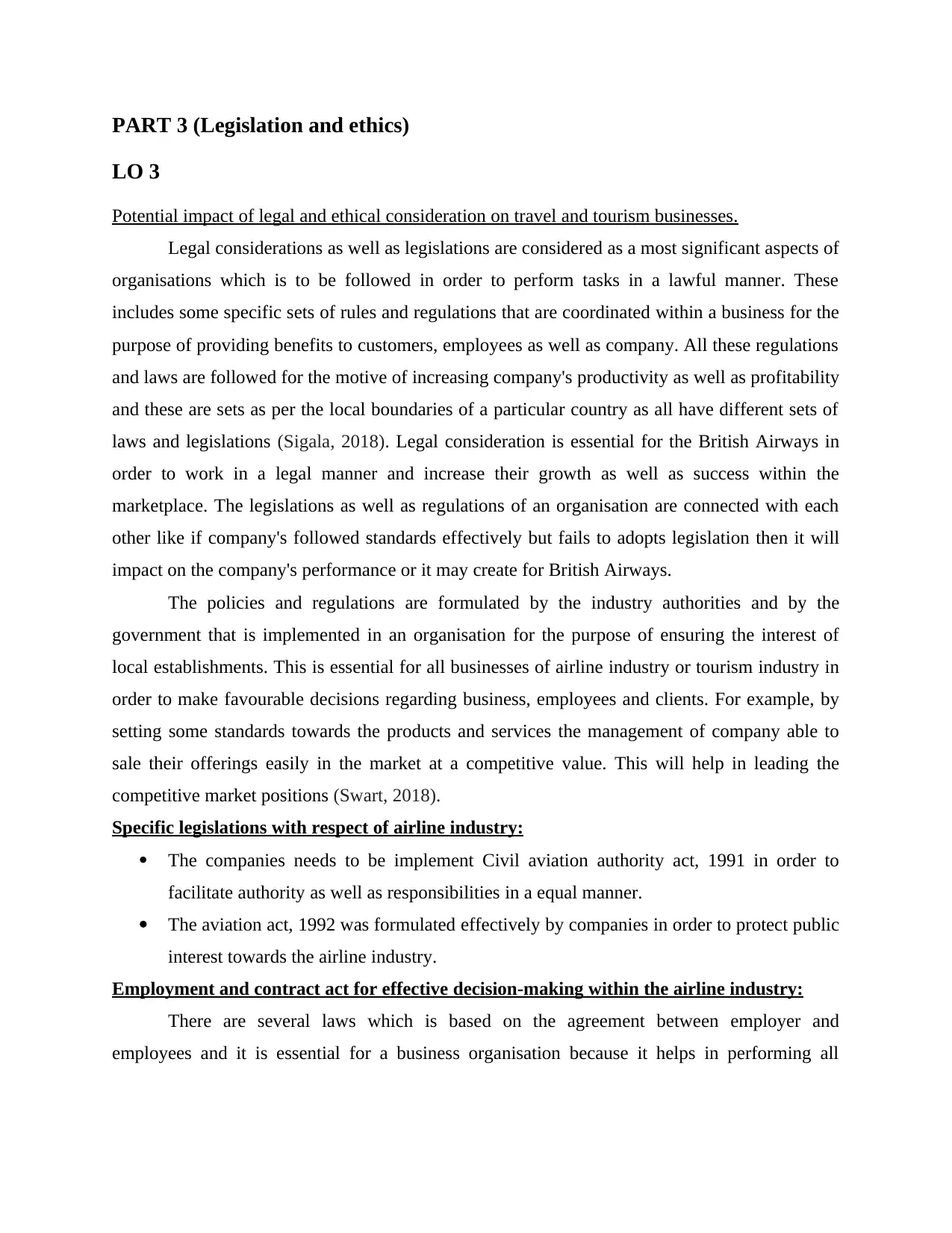
PART 3 (Legislation and ethics)
LO 3
Potential impact of legal and ethical consideration on travel and tourism businesses.
Legal considerations as well as legislations are considered as a most significant aspects of
organisations which is to be followed in order to perform tasks in a lawful manner. These
includes some specific sets of rules and regulations that are coordinated within a business for the
purpose of providing benefits to customers, employees as well as company. All these regulations
and laws are followed for the motive of increasing company's productivity as well as profitability
and these are sets as per the local boundaries of a particular country as all have different sets of
laws and legislations (Sigala, 2018). Legal consideration is essential for the British Airways in
order to work in a legal manner and increase their growth as well as success within the
marketplace. The legislations as well as regulations of an organisation are connected with each
other like if company's followed standards effectively but fails to adopts legislation then it will
impact on the company's performance or it may create for British Airways.
The policies and regulations are formulated by the industry authorities and by the
government that is implemented in an organisation for the purpose of ensuring the interest of
local establishments. This is essential for all businesses of airline industry or tourism industry in
order to make favourable decisions regarding business, employees and clients. For example, by
setting some standards towards the products and services the management of company able to
sale their offerings easily in the market at a competitive value. This will help in leading the
competitive market positions (Swart, 2018).
Specific legislations with respect of airline industry:
The companies needs to be implement Civil aviation authority act, 1991 in order to
facilitate authority as well as responsibilities in a equal manner.
The aviation act, 1992 was formulated effectively by companies in order to protect public
interest towards the airline industry.
Employment and contract act for effective decision-making within the airline industry:
There are several laws which is based on the agreement between employer and
employees and it is essential for a business organisation because it helps in performing all
LO 3
Potential impact of legal and ethical consideration on travel and tourism businesses.
Legal considerations as well as legislations are considered as a most significant aspects of
organisations which is to be followed in order to perform tasks in a lawful manner. These
includes some specific sets of rules and regulations that are coordinated within a business for the
purpose of providing benefits to customers, employees as well as company. All these regulations
and laws are followed for the motive of increasing company's productivity as well as profitability
and these are sets as per the local boundaries of a particular country as all have different sets of
laws and legislations (Sigala, 2018). Legal consideration is essential for the British Airways in
order to work in a legal manner and increase their growth as well as success within the
marketplace. The legislations as well as regulations of an organisation are connected with each
other like if company's followed standards effectively but fails to adopts legislation then it will
impact on the company's performance or it may create for British Airways.
The policies and regulations are formulated by the industry authorities and by the
government that is implemented in an organisation for the purpose of ensuring the interest of
local establishments. This is essential for all businesses of airline industry or tourism industry in
order to make favourable decisions regarding business, employees and clients. For example, by
setting some standards towards the products and services the management of company able to
sale their offerings easily in the market at a competitive value. This will help in leading the
competitive market positions (Swart, 2018).
Specific legislations with respect of airline industry:
The companies needs to be implement Civil aviation authority act, 1991 in order to
facilitate authority as well as responsibilities in a equal manner.
The aviation act, 1992 was formulated effectively by companies in order to protect public
interest towards the airline industry.
Employment and contract act for effective decision-making within the airline industry:
There are several laws which is based on the agreement between employer and
employees and it is essential for a business organisation because it helps in performing all
Paraphrase This Document
Need a fresh take? Get an instant paraphrase of this document with our AI Paraphraser
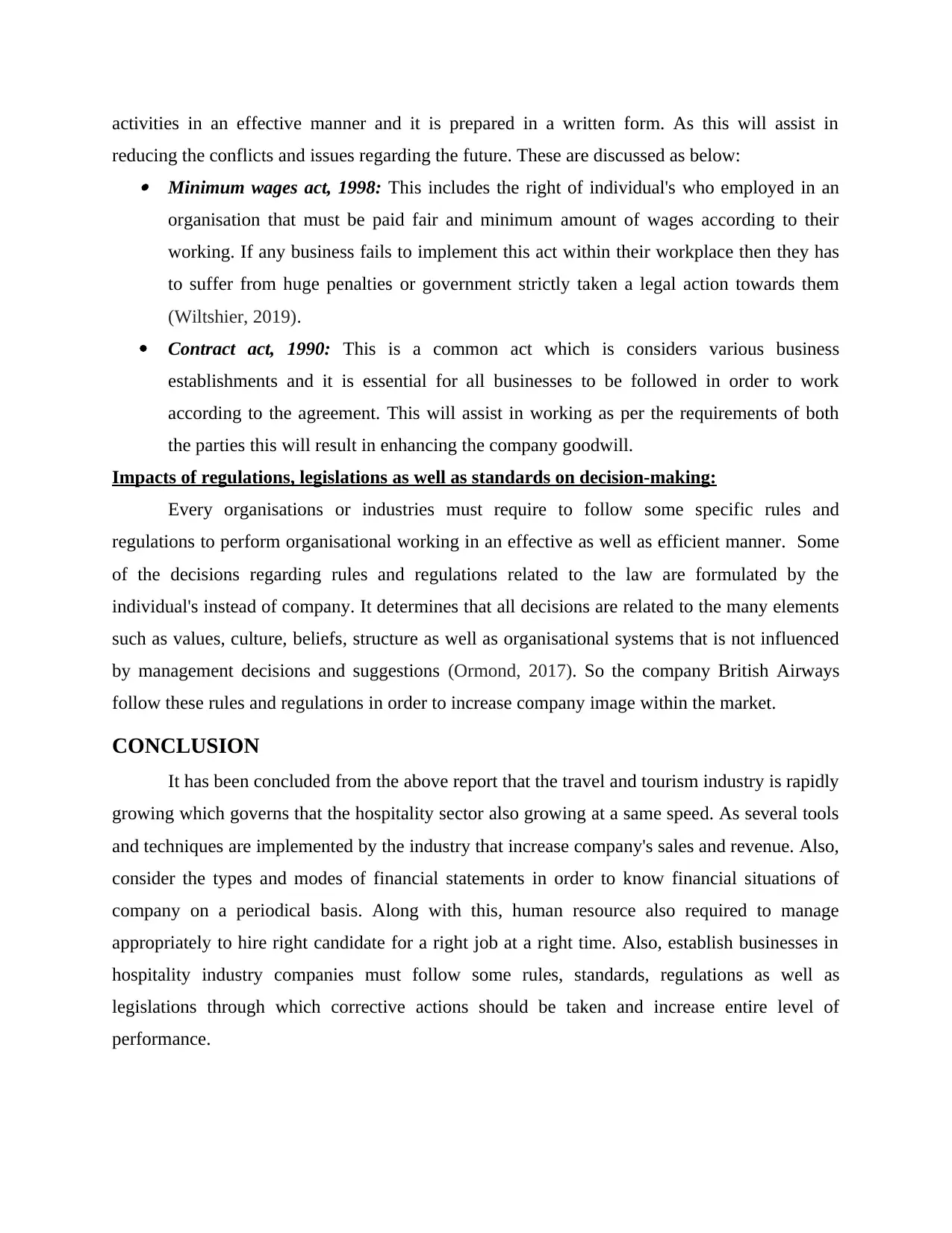
activities in an effective manner and it is prepared in a written form. As this will assist in
reducing the conflicts and issues regarding the future. These are discussed as below: Minimum wages act, 1998: This includes the right of individual's who employed in an
organisation that must be paid fair and minimum amount of wages according to their
working. If any business fails to implement this act within their workplace then they has
to suffer from huge penalties or government strictly taken a legal action towards them
(Wiltshier, 2019).
Contract act, 1990: This is a common act which is considers various business
establishments and it is essential for all businesses to be followed in order to work
according to the agreement. This will assist in working as per the requirements of both
the parties this will result in enhancing the company goodwill.
Impacts of regulations, legislations as well as standards on decision-making:
Every organisations or industries must require to follow some specific rules and
regulations to perform organisational working in an effective as well as efficient manner. Some
of the decisions regarding rules and regulations related to the law are formulated by the
individual's instead of company. It determines that all decisions are related to the many elements
such as values, culture, beliefs, structure as well as organisational systems that is not influenced
by management decisions and suggestions (Ormond, 2017). So the company British Airways
follow these rules and regulations in order to increase company image within the market.
CONCLUSION
It has been concluded from the above report that the travel and tourism industry is rapidly
growing which governs that the hospitality sector also growing at a same speed. As several tools
and techniques are implemented by the industry that increase company's sales and revenue. Also,
consider the types and modes of financial statements in order to know financial situations of
company on a periodical basis. Along with this, human resource also required to manage
appropriately to hire right candidate for a right job at a right time. Also, establish businesses in
hospitality industry companies must follow some rules, standards, regulations as well as
legislations through which corrective actions should be taken and increase entire level of
performance.
reducing the conflicts and issues regarding the future. These are discussed as below: Minimum wages act, 1998: This includes the right of individual's who employed in an
organisation that must be paid fair and minimum amount of wages according to their
working. If any business fails to implement this act within their workplace then they has
to suffer from huge penalties or government strictly taken a legal action towards them
(Wiltshier, 2019).
Contract act, 1990: This is a common act which is considers various business
establishments and it is essential for all businesses to be followed in order to work
according to the agreement. This will assist in working as per the requirements of both
the parties this will result in enhancing the company goodwill.
Impacts of regulations, legislations as well as standards on decision-making:
Every organisations or industries must require to follow some specific rules and
regulations to perform organisational working in an effective as well as efficient manner. Some
of the decisions regarding rules and regulations related to the law are formulated by the
individual's instead of company. It determines that all decisions are related to the many elements
such as values, culture, beliefs, structure as well as organisational systems that is not influenced
by management decisions and suggestions (Ormond, 2017). So the company British Airways
follow these rules and regulations in order to increase company image within the market.
CONCLUSION
It has been concluded from the above report that the travel and tourism industry is rapidly
growing which governs that the hospitality sector also growing at a same speed. As several tools
and techniques are implemented by the industry that increase company's sales and revenue. Also,
consider the types and modes of financial statements in order to know financial situations of
company on a periodical basis. Along with this, human resource also required to manage
appropriately to hire right candidate for a right job at a right time. Also, establish businesses in
hospitality industry companies must follow some rules, standards, regulations as well as
legislations through which corrective actions should be taken and increase entire level of
performance.
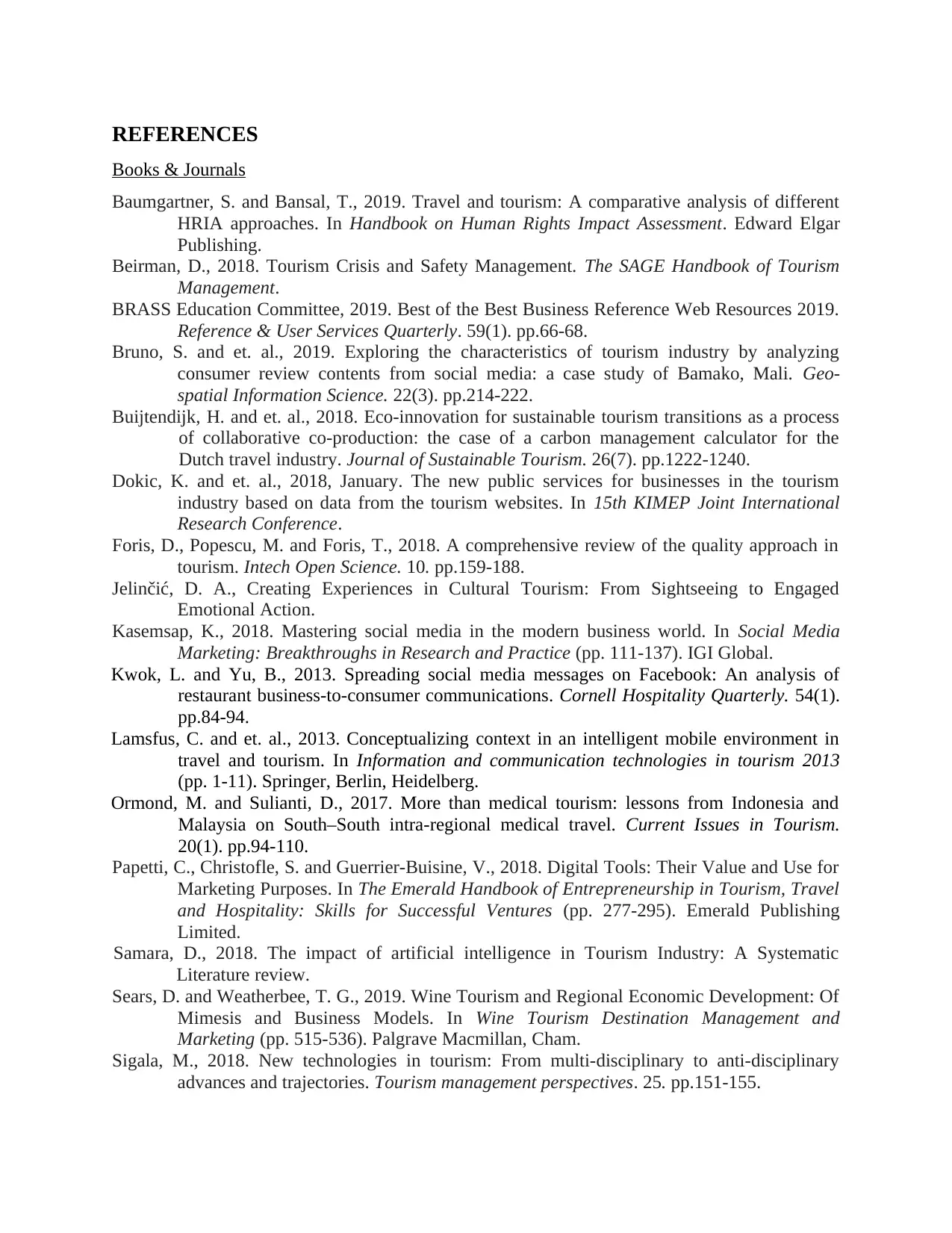
REFERENCES
Books & Journals
Baumgartner, S. and Bansal, T., 2019. Travel and tourism: A comparative analysis of different
HRIA approaches. In Handbook on Human Rights Impact Assessment. Edward Elgar
Publishing.
Beirman, D., 2018. Tourism Crisis and Safety Management. The SAGE Handbook of Tourism
Management.
BRASS Education Committee, 2019. Best of the Best Business Reference Web Resources 2019.
Reference & User Services Quarterly. 59(1). pp.66-68.
Bruno, S. and et. al., 2019. Exploring the characteristics of tourism industry by analyzing
consumer review contents from social media: a case study of Bamako, Mali. Geo-
spatial Information Science. 22(3). pp.214-222.
Buijtendijk, H. and et. al., 2018. Eco-innovation for sustainable tourism transitions as a process
of collaborative co-production: the case of a carbon management calculator for the
Dutch travel industry. Journal of Sustainable Tourism. 26(7). pp.1222-1240.
Dokic, K. and et. al., 2018, January. The new public services for businesses in the tourism
industry based on data from the tourism websites. In 15th KIMEP Joint International
Research Conference.
Foris, D., Popescu, M. and Foris, T., 2018. A comprehensive review of the quality approach in
tourism. Intech Open Science. 10. pp.159-188.
Jelinčić, D. A., Creating Experiences in Cultural Tourism: From Sightseeing to Engaged
Emotional Action.
Kasemsap, K., 2018. Mastering social media in the modern business world. In Social Media
Marketing: Breakthroughs in Research and Practice (pp. 111-137). IGI Global.
Kwok, L. and Yu, B., 2013. Spreading social media messages on Facebook: An analysis of
restaurant business-to-consumer communications. Cornell Hospitality Quarterly. 54(1).
pp.84-94.
Lamsfus, C. and et. al., 2013. Conceptualizing context in an intelligent mobile environment in
travel and tourism. In Information and communication technologies in tourism 2013
(pp. 1-11). Springer, Berlin, Heidelberg.
Ormond, M. and Sulianti, D., 2017. More than medical tourism: lessons from Indonesia and
Malaysia on South–South intra-regional medical travel. Current Issues in Tourism.
20(1). pp.94-110.
Papetti, C., Christofle, S. and Guerrier-Buisine, V., 2018. Digital Tools: Their Value and Use for
Marketing Purposes. In The Emerald Handbook of Entrepreneurship in Tourism, Travel
and Hospitality: Skills for Successful Ventures (pp. 277-295). Emerald Publishing
Limited.
Samara, D., 2018. The impact of artificial intelligence in Tourism Industry: A Systematic
Literature review.
Sears, D. and Weatherbee, T. G., 2019. Wine Tourism and Regional Economic Development: Of
Mimesis and Business Models. In Wine Tourism Destination Management and
Marketing (pp. 515-536). Palgrave Macmillan, Cham.
Sigala, M., 2018. New technologies in tourism: From multi-disciplinary to anti-disciplinary
advances and trajectories. Tourism management perspectives. 25. pp.151-155.
Books & Journals
Baumgartner, S. and Bansal, T., 2019. Travel and tourism: A comparative analysis of different
HRIA approaches. In Handbook on Human Rights Impact Assessment. Edward Elgar
Publishing.
Beirman, D., 2018. Tourism Crisis and Safety Management. The SAGE Handbook of Tourism
Management.
BRASS Education Committee, 2019. Best of the Best Business Reference Web Resources 2019.
Reference & User Services Quarterly. 59(1). pp.66-68.
Bruno, S. and et. al., 2019. Exploring the characteristics of tourism industry by analyzing
consumer review contents from social media: a case study of Bamako, Mali. Geo-
spatial Information Science. 22(3). pp.214-222.
Buijtendijk, H. and et. al., 2018. Eco-innovation for sustainable tourism transitions as a process
of collaborative co-production: the case of a carbon management calculator for the
Dutch travel industry. Journal of Sustainable Tourism. 26(7). pp.1222-1240.
Dokic, K. and et. al., 2018, January. The new public services for businesses in the tourism
industry based on data from the tourism websites. In 15th KIMEP Joint International
Research Conference.
Foris, D., Popescu, M. and Foris, T., 2018. A comprehensive review of the quality approach in
tourism. Intech Open Science. 10. pp.159-188.
Jelinčić, D. A., Creating Experiences in Cultural Tourism: From Sightseeing to Engaged
Emotional Action.
Kasemsap, K., 2018. Mastering social media in the modern business world. In Social Media
Marketing: Breakthroughs in Research and Practice (pp. 111-137). IGI Global.
Kwok, L. and Yu, B., 2013. Spreading social media messages on Facebook: An analysis of
restaurant business-to-consumer communications. Cornell Hospitality Quarterly. 54(1).
pp.84-94.
Lamsfus, C. and et. al., 2013. Conceptualizing context in an intelligent mobile environment in
travel and tourism. In Information and communication technologies in tourism 2013
(pp. 1-11). Springer, Berlin, Heidelberg.
Ormond, M. and Sulianti, D., 2017. More than medical tourism: lessons from Indonesia and
Malaysia on South–South intra-regional medical travel. Current Issues in Tourism.
20(1). pp.94-110.
Papetti, C., Christofle, S. and Guerrier-Buisine, V., 2018. Digital Tools: Their Value and Use for
Marketing Purposes. In The Emerald Handbook of Entrepreneurship in Tourism, Travel
and Hospitality: Skills for Successful Ventures (pp. 277-295). Emerald Publishing
Limited.
Samara, D., 2018. The impact of artificial intelligence in Tourism Industry: A Systematic
Literature review.
Sears, D. and Weatherbee, T. G., 2019. Wine Tourism and Regional Economic Development: Of
Mimesis and Business Models. In Wine Tourism Destination Management and
Marketing (pp. 515-536). Palgrave Macmillan, Cham.
Sigala, M., 2018. New technologies in tourism: From multi-disciplinary to anti-disciplinary
advances and trajectories. Tourism management perspectives. 25. pp.151-155.
⊘ This is a preview!⊘
Do you want full access?
Subscribe today to unlock all pages.

Trusted by 1+ million students worldwide
1 out of 13
Related Documents
Your All-in-One AI-Powered Toolkit for Academic Success.
+13062052269
info@desklib.com
Available 24*7 on WhatsApp / Email
![[object Object]](/_next/static/media/star-bottom.7253800d.svg)
Unlock your academic potential
Copyright © 2020–2026 A2Z Services. All Rights Reserved. Developed and managed by ZUCOL.




